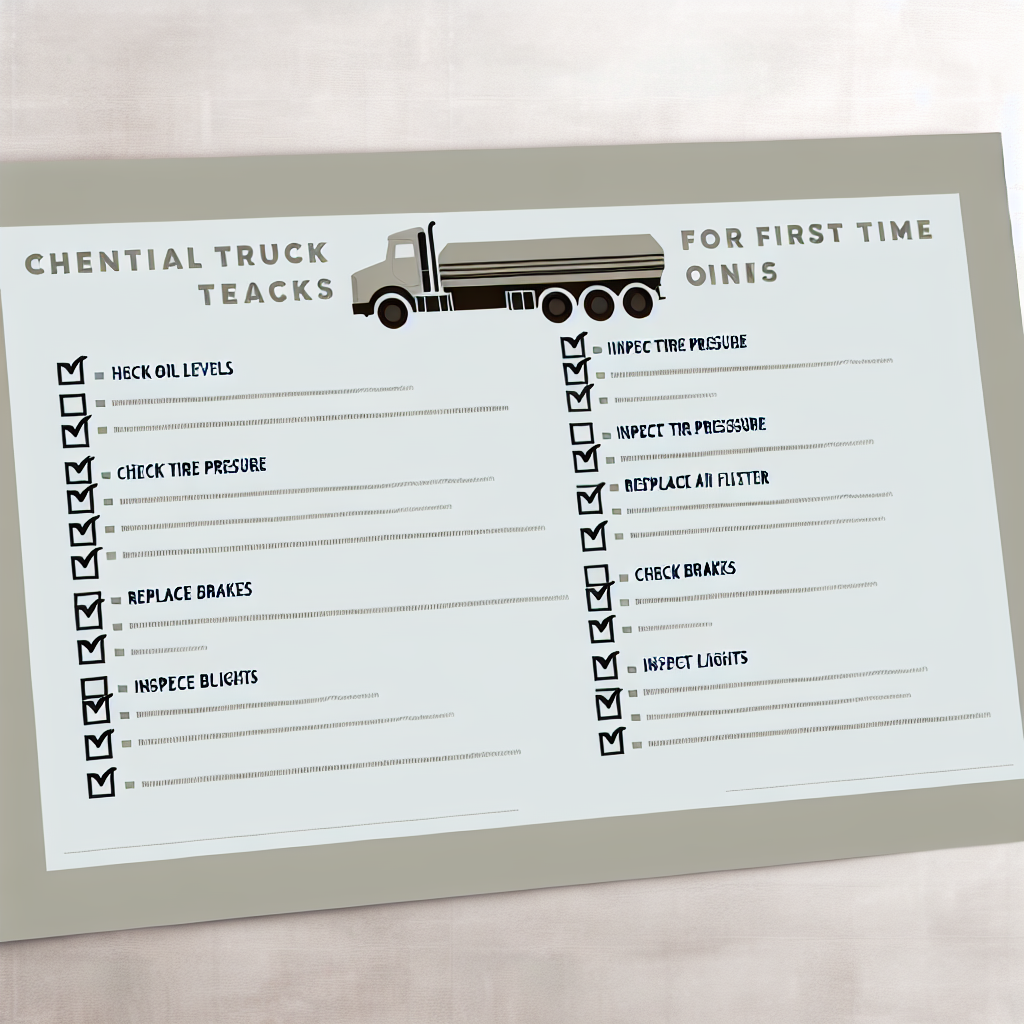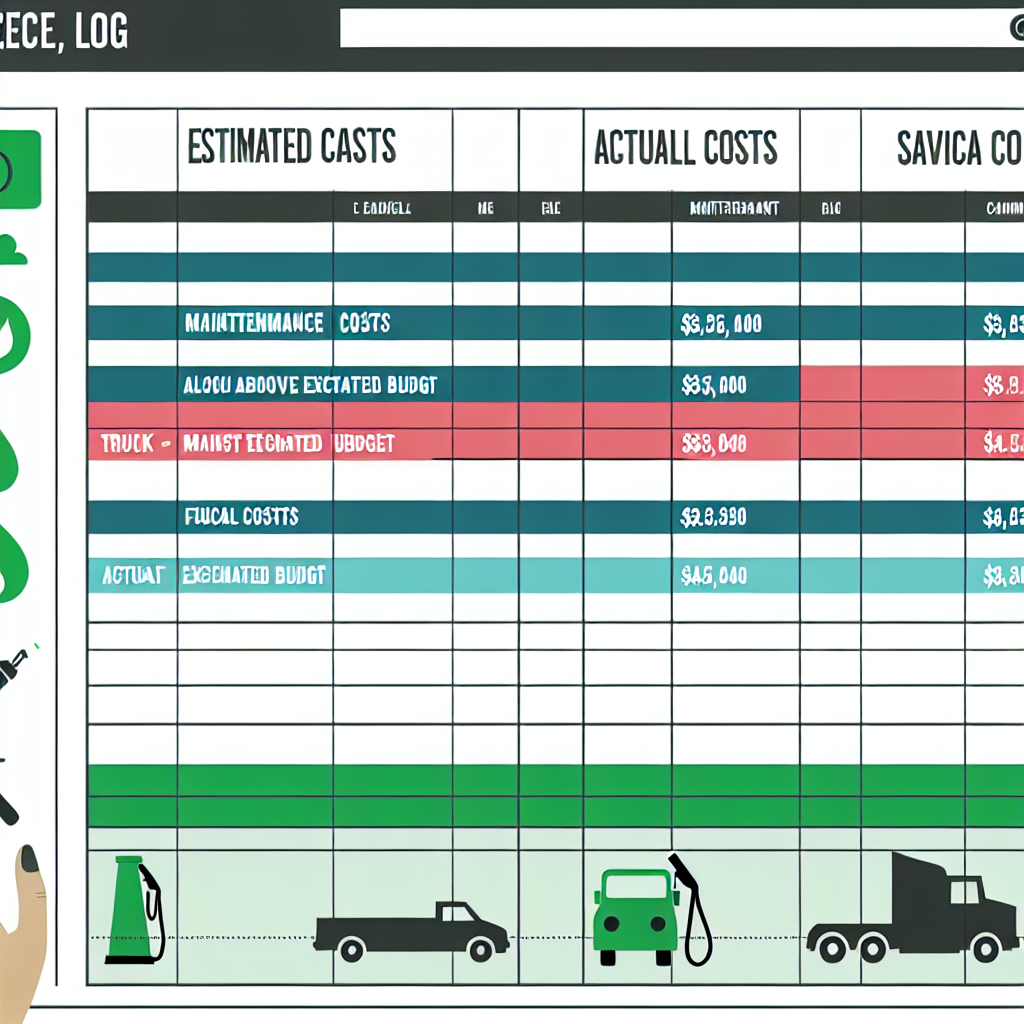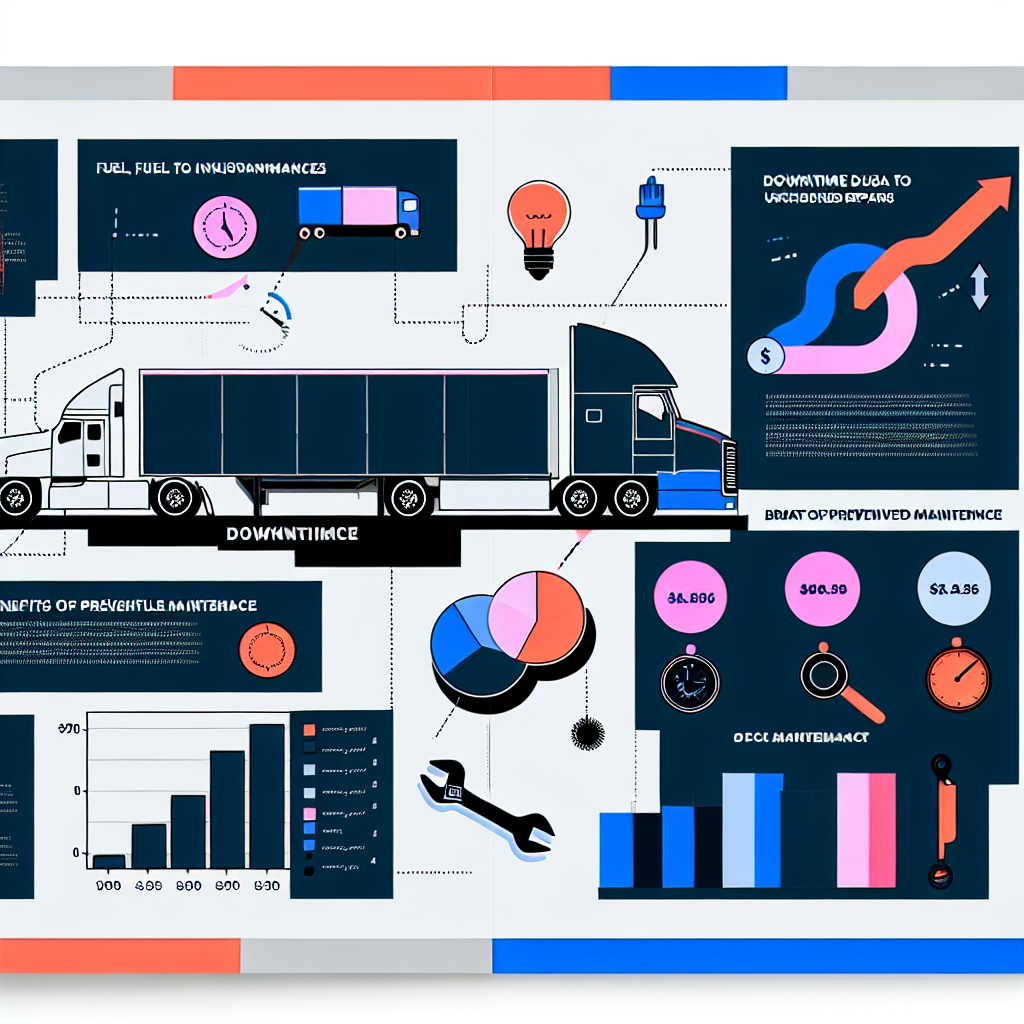Owning a truck can be a rewarding experience, offering utility, freedom, and the ability to tackle a variety of tasks. However, for first-time truck owners, the journey begins with a significant responsibility that extends far beyond the initial purchase price. Successfully managing the complexities of truck ownership requires a keen focus on both financial and mechanical aspects. From budgeting for maintenance and insurance to understanding the importance of routine servicing, being well-prepared is critical for avoiding the pitfalls that can lead to unexpected costs and strains on your finances.
By prioritizing strategic financial planning alongside a commitment to regular maintenance, first-time truck owners can build a sustainable relationship with their vehicle that stands the test of time. This article seeks to guide you through the essential elements of managing your truck effectively, ensuring that you are equipped with the knowledge to navigate this exciting venture confidently.
Common Financial Challenges Faced by First-Time Truck Owners
Owning a truck brings unique financial responsibilities, especially for first-time owners. Understanding these challenges is key to managing your finances well. Here are some common financial hurdles you may face:
- Budgeting for Maintenance: Regular maintenance is essential to keep your truck in good shape. Neglecting this can lead to costly repairs. Set aside a monthly budget for oil changes, tire rotations, and other preventive services to keep your truck running efficiently.
- Navigating Insurance Costs: Finding the right insurance for your truck can be confusing and expensive. It’s important to compare policies from various providers to get the best rates. Comprehensive coverage may be more costly but offers peace of mind in case of accidents.
- Preparing for Repairs: Unexpected repairs can happen at any time, stressing your finances. It’s smart to have a dedicated repair fund. Save a portion of your income regularly to cover unforeseen repair costs so you are not unprepared.
- Avoiding Overspending on Accessories: It’s easy to overspend on accessories for your truck, such as upgrades or cosmetic changes. Focus on essentials that enhance functionality instead of splurging on non-essentials that could strain your budget.
By recognizing these challenges and planning ahead, first-time truck owners can better handle their financial responsibilities, leading to a more satisfying ownership experience.

Importance of Setting Aside Funds for Repairs and Registration
For first-time truck owners, managing unexpected costs can be daunting. One of the most critical steps in ensuring a smooth ownership experience is to set aside funds specifically for necessary expenses, such as registration fees and repairs. These costs can sneak up on new owners, leading to financial stress if not properly planned for.
The phrase, ‘Managing finances as a first-time truck owner comes down to preparation and smart planning,’ underscores the need for foresight when it comes to budget management. An ideal approach would be to allocate a portion of your monthly budget towards these expenses. Generally, you might aim to save about $100 to $200 each month specifically for registration and repairs, depending on the state of your truck and location. This proactive measure can safeguard you against unexpected penalties from late registration or the high costs of sudden repairs.
In practical terms, it helps to create a separate savings account dedicated to these funds. By doing this, you can watch your savings grow without the temptation to spend it on non-essential items. Additionally, remember to keep track of your upcoming registration deadlines and the typical maintenance schedule for your truck to guide your savings plan.
By establishing a dedicated fund for repairs and registration, you not only avoid financial pitfalls but also gain peace of mind, knowing that you are well-prepared for any situation. The commitment to planning will ultimately lead to a more rewarding and stress-free experience as a truck owner.
Average Maintenance Costs for Trucks
The financial responsibilities of truck ownership extend significantly into maintenance costs, which can strain budgets if not properly managed. Here are some critical statistics and insights regarding these costs:
- Average Maintenance Cost Per Mile: In 2023, the average repair and maintenance (R&M) cost per mile for trucks was reported to be approximately $0.202, marking a 3.1% increase from the previous year. This rise is part of a broader trend, with total operational costs reaching about $2.270 per mile, a staggering 33% increase since 2019.
- Annual Maintenance Expenses: For heavy-duty commercial trucks, annual maintenance costs typically fall within the range of $15,000 to $25,000 or more. These figures can vary based on usage intensity and operational conditions, highlighting the diverse financial commitments truck owners must anticipate.
Factors Influencing Maintenance Costs
Several factors significantly influence maintenance costs for truck owners:
- Truck Age and Mileage: Newer trucks generally incur lower maintenance expenses. However, despite the average age of trucks decreasing to 3.8 years in 2023, higher mileage per truck has led to increased maintenance costs.
- Fleet Size: Smaller fleets usually experience higher maintenance costs per mile compared to larger fleets, which can take advantage of economies of scale to reduce per-mile expenditures.
- Rising Parts and Labor Costs: As of the third quarter of 2023, expenses for parts and labor rose by 1.9%, placing additional strain on truck owners’ budgets.
Financial Implications for Truck Owners
The increase in maintenance expenses not only affects truck owners individually but also has wider operational impacts:
- Operational Costs: Higher maintenance expenses contribute to a significant increase in overall operational costs, adversely affecting profitability.
- Downtime Due to Unscheduled Repairs: Unforeseen repairs can lead to critical downtime, resulting in substantial revenue losses. On average, each hour of downtime can cost around $740 in operational losses.
- Benefits of Preventive Maintenance: Truck owners can mitigate some of these costs through proactive maintenance strategies. Implementing such measures can reduce repair expenses by up to 34% over three years, emphasizing the financial advantages of maintaining a disciplined approach to truck maintenance.
By understanding these aspects, first-time truck owners can better anticipate maintenance costs and develop strategies to manage their finances effectively. This knowledge is essential for promoting long-term sustainability and profitability in truck ownership.
| Financing Option | Loan Type | Interest Rate | Payment Plan |
|---|---|---|---|
| Conventional Auto Loan | Secured | 3.5%-7.0% | 36-72 months |
| Personal Loan | Unsecured | 5.0%-20.0% | 24-60 months |
| Lease Financing | Lease Agreement | N/A | 24-60 months |
| Dealer Financing | In-house Financing | 4.0%-9.0% | 36-72 months |
| Government Backed Loan | FHA or VA Loans | 3.25%-4.5% | 15-30 years |
| Credit Union Loan | Secured/Unsecured | 3.0%-6.0% | 36-60 months |
Budgeting for Maintenance and Fuel Costs
For first-time truck owners, budgeting for maintenance and fuel costs is a crucial aspect of ensuring a smooth ownership experience. Here’s how to effectively allocate your finances:
-
Understand Typical Costs:
- Light-Duty Trucks: Annual maintenance costs can vary from $1,200 to $3,000.
- Medium-Duty Trucks: Expect maintenance costs between $4,000 and $7,000 each year.
- Heavy-Duty Trucks: These can incur expenses of $15,000 to $25,000 or more annually. Understanding these averages helps in setting realistic budget expectations. [source]
-
Monitor Fluctuating Fuel Prices:
Fuel prices can vary significantly throughout the year. First-time truck owners should keep an eye on these fluctuations and plan for seasonal variations to adjust their budgets.
- Keep track of fuel prices in your area. As a rule of thumb, allocate funds for fuel based on expected mileage and average fuel consumption for your truck type. Light-duty pickups typically average around 15 to 20 miles per gallon. [source]
-
Set Aside a Maintenance Fund:
It is essential to establish a dedicated fund for routine maintenance and unexpected repairs. Experts suggest setting aside between 7 to 15 cents per mile driven to cover these costs. This proactive approach can prevent financial strain when faced with urgent repairs.
-
Create a Budgeting Spreadsheet:
Use a budgeting spreadsheet to track estimated and actual costs for maintenance, repairs, and fuel. This visual tool can provide clarity on your spending habits and guide adjustments as necessary.

-
Keep Records of Past Expenses:
Documenting past expenses will give first-time truck owners insights into their typical costs, helping them to anticipate future spending more accurately.
By adopting these budgeting strategies, first-time truck owners can stay ahead of their financial responsibilities and enjoy a more manageable and rewarding ownership experience.

Conclusion: Embracing the Journey of Financial Responsibility as a First-Time Truck Owner
The journey of truck ownership is not merely a financial commitment; it is an opportunity to engage in a meaningful relationship with a vehicle that can significantly enhance your life. Being a first-time truck owner requires embracing the responsibilities that come with it, but it also opens doors to freedom, adventure, and invaluable experiences.
- Crafting a Detailed Budget: Developing a comprehensive budget sets the stage for your ownership experience. By accounting for all expenses, from loan payments and insurance to maintenance and fuel, you create a roadmap that guides your financial decisions confidently.
- Building Emergency and Maintenance Funds: Prioritize establishing funds dedicated to unforeseen incidents and regular upkeep. This financial cushion not only protects you against unexpected costs but also cultivates peace of mind, knowing you are prepared for the road ahead.
- Understanding Comprehensive Ownership Costs: Recognize that the initial purchase price is just the beginning of your vehicle’s financial journey. Awareness of ongoing costs will empower you to manage your budget effectively, preventing unwelcome surprises.
- Smart Debt Management: If your truck is financed, selecting manageable loan terms aligned with your financial capacity is essential. This proactive approach ensures that your ownership experience is not marred by overwhelming financial strain.
- Regular Financial Check-Ins: Regularly revisiting your budget and financial situation is crucial. Adjustments based on your evolving needs will position you for ongoing success, while guidance from financial advisors can further illuminate your path.
As a first-time truck owner, embracing these strategies fosters a rewarding ownership experience filled with personal growth and satisfaction. With preparation, foresight, and a commitment to financial responsibility, you can confidently embark on this exciting journey, making the most of the adventures and opportunities that await you. Your truck is not just a vehicle; it’s a partner on the road to new experiences.
“Managing finances as a first-time truck owner comes down to preparation and smart planning.”
This quote serves as a reminder that foresight and strategic budgeting are crucial for successful truck ownership.
Common Financial Challenges Faced by First-Time Truck Owners
…Prioritize essential accessories that enhance functionality rather than indulging in unnecessary purchases that can lead to overspending. Doing so can help you keep your budget intact and avoid the concern that arises from financial mismanagement.
Importance of Setting Aside Funds for Repairs and Registration
…This proactive measure can safeguard you against unexpected penalties from late registration or the high costs of sudden repairs. Additionally, “The purchase price of a truck is only the beginning.” This quote emphasizes that prospective truck owners need to consider not just the initial purchase but ongoing costs.
Average Maintenance Costs for Trucks
…owners can better anticipate maintenance costs and develop strategies to manage their finances effectively. Understanding these aspects will help you gracefully navigate the financial landscape of truck ownership for years to come.
Budgeting for Maintenance and Fuel Costs
…This visual tool can provide clarity on your spending habits and guide adjustments as necessary. In tandem with a solid budgeting strategy, remember that monitoring your truck’s needs will lead to better long-term financial health in your ownership journey.

This graph displays the average maintenance costs for light-duty, medium-duty, and heavy-duty trucks, illustrating the considerable expenses associated with truck ownership and maintenance.

This image outlines key financial implications of truck ownership, including operational costs, downtime due to unscheduled repairs, and benefits of preventive maintenance.
Average Maintenance Costs for Trucks
The financial responsibilities of truck ownership extend significantly into maintenance costs, which can strain budgets if not properly managed. Here are some critical statistics and insights regarding these costs based on recent research:
- Average Maintenance Cost Per Mile: According to Schneider Owner Operators, in 2023, the average repair and maintenance (R&M) cost per mile for trucks was reported to be approximately $0.202, marking a 3.1% increase from the previous year. This rise is part of a broader trend, with total operational costs reaching about $2.270 per mile, a staggering 33% increase since 2019. Source here
- Annual Maintenance Expenses: For heavy-duty commercial trucks, annual maintenance costs typically fall within the range of $15,000 to $25,000 or more. These figures can vary based on usage intensity and operational conditions, highlighting the diverse financial commitments truck owners must anticipate. (Shred Truck Repair)
Factors Influencing Maintenance Costs
Several factors significantly influence maintenance costs for truck owners:
- Truck Age and Mileage: Newer trucks generally incur lower maintenance expenses. However, despite the average age of trucks decreasing to 3.8 years in 2023, higher mileage per truck has led to increased maintenance costs.
- Fleet Size: Smaller fleets usually experience higher maintenance costs per mile compared to larger fleets, which can take advantage of economies of scale to reduce per-mile expenditures.
- Rising Parts and Labor Costs: As of the third quarter of 2023, expenses for parts and labor have risen, placing additional strain on truck owners’ budgets.
Financial Implications for Truck Owners
The increase in maintenance expenses not only affects truck owners individually but also has wider operational impacts:
- Operational Costs: Higher maintenance expenses contribute to a significant increase in overall operational costs, adversely affecting profitability.
- Downtime Due to Unscheduled Repairs: Unforeseen repairs can lead to critical downtime, resulting in substantial revenue losses. On average, each hour of downtime can cost around $740 in operational losses. source
- Benefits of Preventive Maintenance: Implementing proactive maintenance strategies can reduce repair expenses by up to 34% over three years, emphasizing the financial advantages of maintaining a disciplined approach to truck maintenance.
By understanding these aspects, first-time truck owners can better anticipate maintenance costs and develop strategies to manage their finances effectively. This knowledge is essential for promoting long-term sustainability and profitability in truck ownership.
Conclusion: Embracing the Journey of Financial Responsibility as a First-Time Truck Owner
The journey of truck ownership is not merely a financial commitment; it invites engagement in a meaningful relationship with a vehicle that enhances life. Developing a comprehensive budget sets the stage for ownership, accounting for loan payments, insurance, maintenance, and gas.
As a first-time truck owner, embracing these strategies fosters a rewarding ownership experience filled with personal growth and satisfaction. With preparation and commitment, you can confidently embark on this journey, making the most of the adventures that await you. Your truck is not just a vehicle; it’s a partner on the road to new experiences.
By integrating these insights and resources, you can navigate the financial landscape of truck ownership with greater clarity and confidence.
Managing Finances and Truck Maintenance Tips for First-Time Truck Owners
Owning a truck can be a rewarding experience, offering utility, freedom, and the ability to tackle a variety of tasks. However, for first-time truck owners, the journey begins with a significant responsibility that extends far beyond the initial purchase price. Successfully managing the complexities of truck ownership requires a keen focus on both financial and mechanical aspects. From budgeting for maintenance and insurance to understanding the importance of routine servicing, being well-prepared is critical for avoiding the pitfalls that can lead to unexpected costs and strains on your finances. By prioritizing strategic financial planning alongside a commitment to regular maintenance, first-time truck owners can build a sustainable relationship with their vehicle that stands the test of time. This article seeks to guide you through the essential elements of managing your truck effectively, ensuring that you are equipped with the knowledge to navigate this exciting venture confidently.
Common Financial Challenges Faced by First-Time Truck Owners
Owning a truck brings unique financial responsibilities, especially for first-time owners. Understanding these challenges is key to managing your finances well. Here are some common financial hurdles you may face:
- Truck Maintenance Tips: Regular maintenance is essential to keep your truck in good shape. Neglecting this can lead to costly repairs. Set aside a monthly budget for oil changes, tire rotations, and other preventive services to keep your truck running efficiently.
- Navigating Insurance Costs: Finding the right insurance for your truck can be confusing and expensive. It’s important to compare policies from various providers to get the best rates. Comprehensive coverage may be more costly but offers peace of mind in case of accidents.
- Preparing for Repairs: Unexpected repairs can happen at any time, stressing your finances. It’s smart to have a dedicated repair fund. Save a portion of your income regularly to cover unforeseen repair costs so you are not unprepared.
- Avoiding Overspending on Accessories: It’s easy to overspend on accessories for your truck, such as upgrades or cosmetic changes. Focus on essentials that enhance functionality instead of splurging on non-essentials that could strain your budget.
Importance of Setting Aside Funds for Repairs and Registration
For first-time truck owners, managing unexpected costs can be daunting. One of the most critical steps in ensuring a smooth ownership experience is to set aside funds specifically for necessary expenses, such as registration fees and repairs. These costs can sneak up on new owners, leading to financial stress if not properly planned for.
The phrase, ‘Managing finances as a first-time truck owner comes down to preparation and smart planning,’ underscores the need for foresight when it comes to budget management. An ideal approach would be to allocate a portion of your monthly budget towards these expenses. Generally, you might aim to save about $100 to $200 each month specifically for registration and repairs, depending on the state of your truck and location. This proactive measure can safeguard you against unexpected penalties from late registration or the high costs of sudden repairs.
In practical terms, it helps to create a separate savings account dedicated to these funds. By doing this, you can watch your savings grow without the temptation to spend it on non-essential items. Additionally, remember to keep track of your upcoming registration deadlines and the typical maintenance schedule for your truck to guide your savings plan.
By establishing a dedicated fund for repairs and registration, you not only avoid financial pitfalls but also gain peace of mind, knowing that you are well-prepared for any situation. The commitment to planning will ultimately lead to a more rewarding and stress-free experience as a truck owner.
Average Maintenance Costs for Trucks
The financial responsibilities of truck ownership extend significantly into maintenance costs, which can strain budgets if not properly managed. Here are some critical statistics and insights regarding these costs:
- Average Maintenance Cost Per Mile: In 2023, the average repair and maintenance (R&M) cost per mile for trucks was reported to be approximately $0.202, marking a 3.1% increase from the previous year. This rise is part of a broader trend, with total operational costs reaching about $2.270 per mile, a staggering 33% increase since 2019.
- Annual Maintenance Expenses: For heavy-duty commercial trucks, annual maintenance costs typically fall within the range of $15,000 to $25,000 or more. These figures can vary based on usage intensity and operational conditions, highlighting the diverse financial commitments truck owners must anticipate.
Financing Options Comparison for Truck Owners
| Financing Option | Loan Type | Interest Rate | Payment Plan |
|---|---|---|---|
| Conventional Auto Loan | Secured | 3.5%-7.0% | 36-72 months |
| Personal Loan | Unsecured | 5.0%-20.0% | 24-60 months |
| Lease Financing | Lease Agreement | N/A | 24-60 months |
| Dealer Financing | In-house Financing | 4.0%-9.0% | 36-72 months |
| Government Backed Loan | FHA or VA Loans | 3.25%-4.5% | 15-30 years |
| Credit Union Loan | Secured/Unsecured | 3.0%-6.0% | 36-60 months |
Budgeting for Maintenance and Fuel Costs
For first-time truck owners, budgeting for maintenance and fuel costs is a crucial aspect of ensuring a smooth ownership experience. Here’s how to effectively allocate your finances:
- Understand Typical Costs:
- Light-Duty Trucks: Annual maintenance costs can vary from $1,200 to $3,000.
- Medium-Duty Trucks: Expect maintenance costs between $4,000 and $7,000 each year.
- Heavy-Duty Trucks: These can incur expenses of $15,000 to $25,000 or more annually. Understanding these averages helps in setting realistic budget expectations. (source)
- Monitor Fluctuating Fuel Prices:
Fuel prices can vary significantly throughout the year. First-time truck owners should keep an eye on these fluctuations and plan for seasonal variations to adjust their budgets. Keep track of fuel prices in your area. As a rule of thumb, allocate funds for fuel based on expected mileage and average fuel consumption for your truck type. Light-duty pickups typically average around 15 to 20 miles per gallon. (source)
- Set Aside a Maintenance Fund:
It is essential to establish a dedicated fund for routine maintenance and unexpected repairs. Experts suggest setting aside between 7 to 15 cents per mile driven to cover these costs. This proactive approach can prevent financial strain when faced with urgent repairs.
- Create a Budgeting Spreadsheet:
Use a budgeting spreadsheet to track estimated and actual costs for maintenance, repairs, and fuel. This visual tool can provide clarity on your spending habits and guide adjustments as necessary.
- Keep Records of Past Expenses:
Documenting past expenses will give first-time truck owners insights into their typical costs, helping them to anticipate future spending more accurately.
By adopting these budgeting strategies, first-time truck owners can stay ahead of their financial responsibilities and enjoy a more manageable and rewarding ownership experience.
